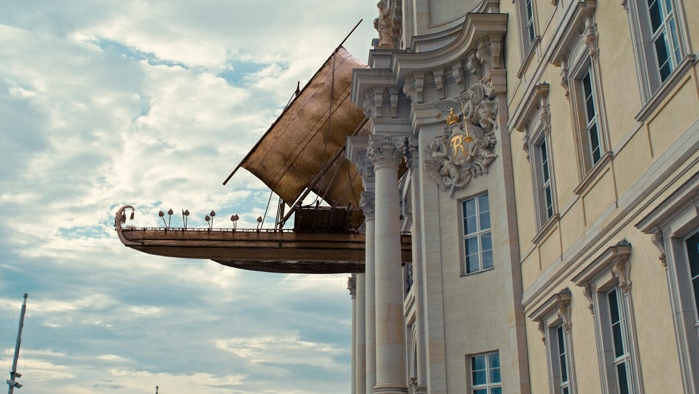Press Release
A majestic hand-

International Archives 2nd half of 2024
Tuan Andrew Nguyen, When Water Embraces Empty Space
Edith-Russ-Haus for Media Art, Oldenburg (Germany)
31.10.2024 - 05.01.2025

The sixteen-
According to the historian Götz Aly in his book The Magnificent Boat, the arrival of the Luf boat to the Berlin collection has a dark and troubling history. The object is connected to the sustained violence that the Imperial German Navy and German traders perpetrated on the people of Papua New Guinea. The islands’ forest and natural resources were destroyed and replaced with plantations, which the Papuans were forced to work on, and the colonizers raped local women. When the islanders resisted these atrocities, the Imperial Crown ordered their massacre through so-
In 2021, the Humboldt Forum commissioned a video interview with descendants of the few Luf inhabitants who survived this colonial aggression. They expressed their wish to see the boat, mourned their community’s lost knowledge of how to produce this type of watercraft, and expressed a hope to reconnect with it.
Tuấn Andrew Nguyễn ‘s exploration started from this juncture: his goal became to fulfill this wish and make the meeting possible. The artist believes that the Luf boat is a bridge between the past and the future, between the dominant narrative of German colonialism and the erased stories of the people of Papua New Guinea. It is a bridge between fact and fiction, testimony and resilience.
The exhibition’s series of multichannel film installations together present a narrative built from conversations between the Luf boat builders’ descendants,—Stanley Inum, Fordy Stanley and Enoch Lun—and the Humboldt Forum team as well as documentation of the islanders’ long-
Colonialism destroys and controls memory. In the wake of all this destruction, what strategies do we have to recuperate memory? Can fiction fill in the gaps, give agency, and act as a tool of healing inside the voids that remain?
Maybe the boat needs to float out of the museum, where it is being displayed, and disappear in the oceans as it was meant to be—a sea burial for the chief of Luf or for a larger more metaphorical burial, one of the continuation of colonial ideals in our current times.
Tuấn Andrew Nguyễn’s practice explores the power of memory and its potential to act as a form of political resistance. The Vietnamese/US artists’ practice is fuelled by research and a commitment to communities that have faced traumas caused by colonialism, war, and displacement. Through his continuous attempts to engage with vanishing or vanquished historical memory, Nguyễn investigates the erasures that the colonial project has brought to bear on certain parts of the world. Through this collaborative practice, he explores memory as a form of resistance and empowerment, emphasizing the power of storytelling as a means for healing, empathy and solidarity.
Nguyễn has received several awards in both film and visual arts, including an Art Matters grant in 2010 and a VIA Art Fund grant. He won the Joan Miró Foundation award in 2023. His work has been included in several international exhibitions including the Asia Pacific Triennial 2006, the Whitney Biennial 2017, the Sharjah Biennial 2019 and Berlin Biennale 2022.
Exhibition 31 October 2024 -

© ArtCatalyse International / Marika Prévosto 2024 All Rights Reserved
Tuấn Andrew Nguyễn, When Water Embraces Empty Space (still), 2024. Courtesy of the artist and James Cohan, NY.
